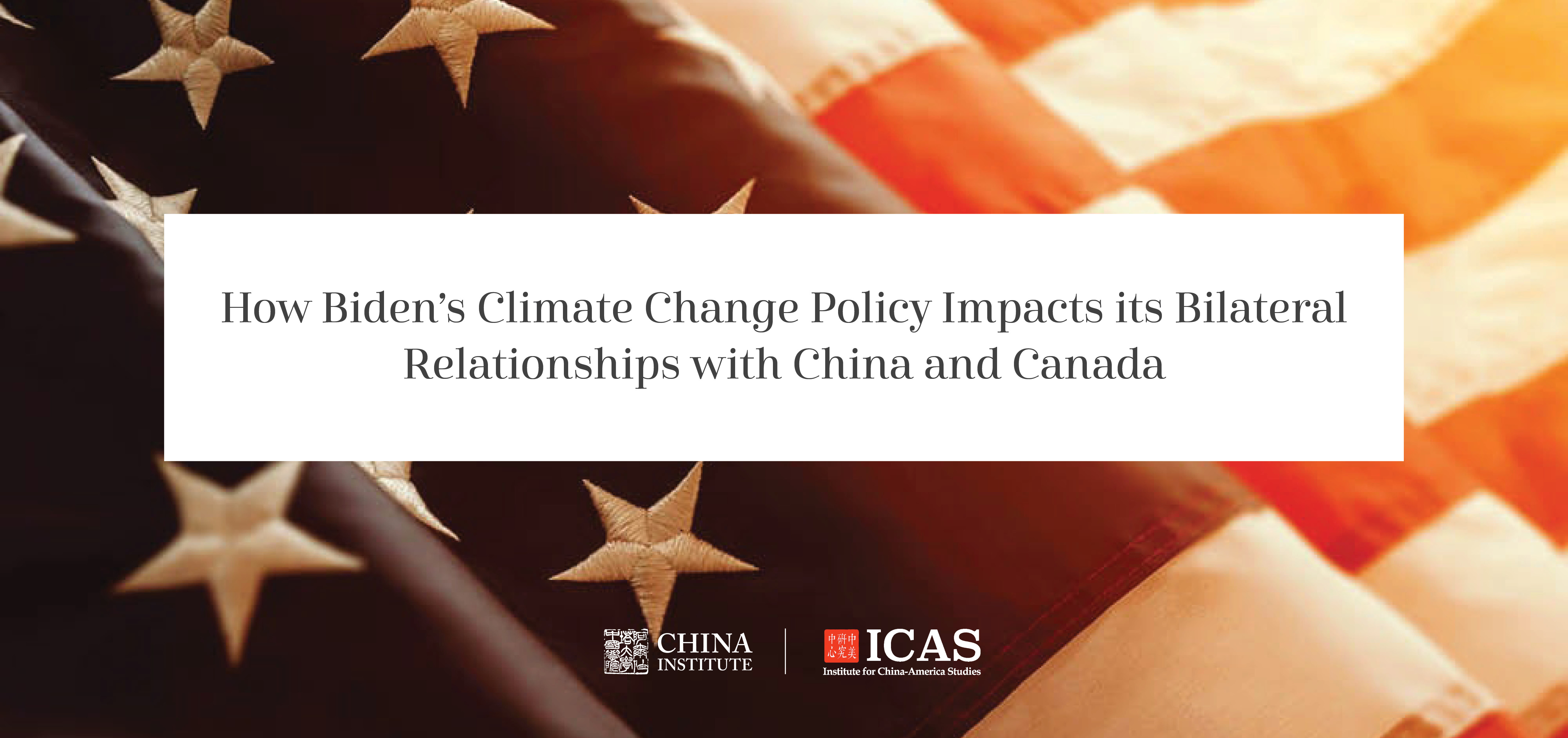How Biden’s Climate Change Policy Impacts its Bilateral Relationships with China and Canada

Date: March 4, 2021
Time: 9:00 am – 10:15 am MST (11:00 am to 12:15pm EST)
U.S. President Biden began taking executive action immediately following his inauguration to enact many of his administration’s initial priorities, including two executive orders on climate change and environment. The overarching aim is to “center the climate crisis” in U.S. foreign policy and national security, and to create a “whole-of-government approach” to shifting the country from reliance on fossil fuels to sources of low- or no-carbon energy. Another related executive order was the revocation of the Keystone XL pipeline expansion project, an oil pipeline system in Canada and the United States, permit to continue.
Biden’s climate change policy has deep implications for its relationship with China and Canada. The U.S.-China climate relationship during the Obama administration was central to the global progress that culminated in the Paris climate agreement. The deterioration of U.S.-China relations during the Trump Administration has complicated the capacity of both sides to work together on climate change. Reviving the climate cooperation and engagement is vitally important and urgent.
Canada’s Prime Minister, Justin Trudeau, while welcoming some of the executive orders Biden signed, expressed disappointment over the Keystone XL Pipeline permit cancellation. The Alberta premier called Biden's XL cancellation a 'gut punch' for the U.S.-Canada trade relationship. However, environmentalists and Native American groups, who have fought the project for more than a decade, praised the move. Development of the pipeline was blocked by the Obama administration in 2015, but Trump overturned that order and allowed it to continue. Some argue that cancelling the multi-billion-dollar Keystone XL pipeline expansion will jeopardize thousands of jobs in Alberta, won’t reduce oil dependency, and will threaten the supply security for those refineries.
As the United States shows early signs of recommitting itself to the global climate agenda, its effects on global energy supplies, food security, trade, and more are potentially enormous. Thus, its relationships with its partners and competitors will be similarly impacted. This one-hour dialogue will bring together experts from the United States, Canada and China in order to better understand the economic and security impacts and consequences of the Biden administration’s climate and environmental policies on the U.S.-Canada relationship and the U.S.-China relationship.
Speakers
Sally Yozell
Director, Environmental Security, Stimson Center (The United States)

Sally Yozell is a Senior Fellow and Director of the Environmental Security program at the Stimson Center. Yozell’s research examines the suite of environmental threats that have the potential to undermine national, regional, or global security. Her work focuses on ocean security, climate security and wildlife protection.
Yozell leads a team of experts who explore the links between natural resources protection, environmental crime and global security issues to develop security strategies that combat illegal, unreported, and unregulated (IUU) fishing, thwart illicit wildlife networks and increase transparency and traceability throughout the seafood supply chain. She also devises innovative resiliency strategies to address climate and ocean risk, particularly in coastal cities. Since 2017 Yozell has served in an advisory role to the host governments for the annual global Our Ocean Conference. She and her team conduct research and take it to action by engaging civil society, governments and the private sector.
Kevin Tu
Adjunct Professor, the School of Environment of Beijing Normal University (China), Former China Program Manager, International Energy Agency
 Kevin Tu is a senior advisor at Agora Energiewende, where he leads Agora’s work on China’s energy and climate policies. He is also an adjunct professor at the School of Environment of Beijing Normal University, and a non-resident fellow at the Center on Global Energy Policy of Columbia University and Institut français des relations internationals (Ifri).
Kevin Tu is a senior advisor at Agora Energiewende, where he leads Agora’s work on China’s energy and climate policies. He is also an adjunct professor at the School of Environment of Beijing Normal University, and a non-resident fellow at the Center on Global Energy Policy of Columbia University and Institut français des relations internationals (Ifri).
Jennifer Winter
Associate Professor of Economics and Scientific Director of the Energy and Environmental Policy research division at the School of Public Policy, University of Calgary (Canada)
 Dr. Jennifer Winter (PhD, Calgary) is an Associate Professor of Economics and Scientific Director of the Energy and Environmental Policy research division at The School of Public Policy, University of Calgary. Her research evaluates climate policies, and examines the effects of government regulation and policy on energy development and the associated consequences and trade-offs.
Dr. Jennifer Winter (PhD, Calgary) is an Associate Professor of Economics and Scientific Director of the Energy and Environmental Policy research division at The School of Public Policy, University of Calgary. Her research evaluates climate policies, and examines the effects of government regulation and policy on energy development and the associated consequences and trade-offs.
Her research interests include emissions pricing, environmental and energy policy, innovation and energy transitions, and Canadian economic history.
Ranping Song
Developing Country Climate Action Manager, World Resources Institute (the United States)
 Working with the International Climate Action Initiative of WRI’s Global Climate Program, Ranping serves as the global focal point across WRI for work on Intended Nationally Determined Contributions (INDCs) and developing country actions. He engages with and coordinates teams across WRI on the full range of issues addressed in INDCs, including mitigation, adaptation and finance. He also coordinates with in-country climate team leads in WRI’s country offices and supports them on the development and implementation of climate strategies in developing countries. From 2012 to 2015, Ranping served as the Team Lead for China Climate Program, where he led the development and implementation of climate strategy in China. Before then, he served as an Associate and Program Manager for the GHG Protocol in China.
Working with the International Climate Action Initiative of WRI’s Global Climate Program, Ranping serves as the global focal point across WRI for work on Intended Nationally Determined Contributions (INDCs) and developing country actions. He engages with and coordinates teams across WRI on the full range of issues addressed in INDCs, including mitigation, adaptation and finance. He also coordinates with in-country climate team leads in WRI’s country offices and supports them on the development and implementation of climate strategies in developing countries. From 2012 to 2015, Ranping served as the Team Lead for China Climate Program, where he led the development and implementation of climate strategy in China. Before then, he served as an Associate and Program Manager for the GHG Protocol in China.
Moderator
Nong Hong
Executive Director, Institute for China-America Studies and Senior Research Fellow, China Institute, University of Alberta Dr. Nong Hong heads the Institute for China-America Studies (ICAS), an independent, non-profit academic institution launched by the Hainan Nanhai Research Foundation. She also holds a joint position of research fellow with China Institute, University of Alberta (CIUA), National Institute for South China Sea Studies (NISCSS), and the China Center for Collaborated Studies on the South China Sea, Nanjing University (CCSCS).
Dr. Nong Hong heads the Institute for China-America Studies (ICAS), an independent, non-profit academic institution launched by the Hainan Nanhai Research Foundation. She also holds a joint position of research fellow with China Institute, University of Alberta (CIUA), National Institute for South China Sea Studies (NISCSS), and the China Center for Collaborated Studies on the South China Sea, Nanjing University (CCSCS).